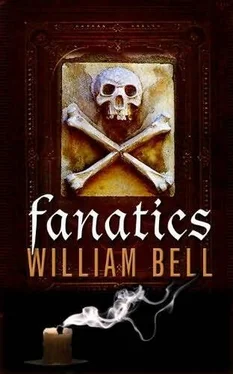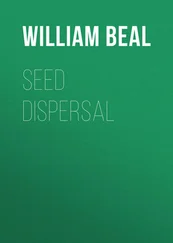Raphaella played with her pencil, standing it point down on the writing pad, sliding her fingers down the length, reversing it, jabbing the eraser end down, repeating the motion.
“She’s in denial. Unless…” she said mysteriously, beginning to doodle.
“Unless what?”
“Maybe the professor kept her away not to hide a secret but to protect her.”
“That could be it. If somebody knows you don’t know, you’re safe. If they know you know, you’re a threat.”
Raphaella gave me a look. “I think I followed that.”
“Mrs. Stoppini still won’t come in here,” I continued, “even though the prof is dead and everything here belongs to her now-or is under her control, since she’s the executor of his will.”
“Hmm. So what’s our next step? Confront her with what we know? Ask her if she’s seen or heard anything… out of the ordinary?”
“Better to let things develop,” I answered. “Until we learn more.”
I got the keys from the desk and opened the secret cupboard, then laid out the Compendium Revelationem , the file folder, the box containing the medal, and the cross on the square table. For a moment my eyes rested on the Compendium -the ancient book that had been written by the man whose spirit was haunting me-and I shivered. The book was like a weapon with a dark history.
I picked up the file containing the professor’s manuscript and carried it to Raphaella at the table. “Enjoy,” I said, setting it down.
She unwound the string, opened the stiff paper file, and slid out the stack of sheets.
“It’s typewritten,” she observed, leafing through the pile.
“Yeah, on the Underwood over there on the escritoire.” I looked closer. “He’d been editing with a pencil, just like Mom does.”
“You realize,” Raphaella said, “this is probably the only copy.”
“I never thought about it. If he had word-processed the book, why bother to make a copy by banging away on an ancient typewriter? He wrote this here, in this room.”
I fetched the professor’s magnifying glass from the escritoire and examined the back of a sheet, talking as I peered through the glass. “People used to make carbon copies as they typed, by putting carbon paper between two sheets of stock before typing. But I don’t see any evidence of that.”
“How do you know all that stuff?”
“I work in an antiques store. And my father is at least a century behind the times. He’d fit right in around here.”
Raphaella smiled, then her eyes returned to the manuscript. “I guess we can’t take it away with us and get it photocopied.”
“Nope. I’m-we’re-not supposed to remove anything from this room.”
“Where can we get hold of a portable photocopy machine or a scanner?”
“I don’t-”
“Wait!”
Raphaella pulled her new phone from her backpack. “I’ve got one right here! The PIE has a camera! I can shoot the pages and email them to myself.”
She then put down the PIE, placed the manuscript pages back on the stack, and straightened it. She picked up her pencil and slid the writing pad closer.
“In the meantime,” she said, “let’s do some reading.”
AS RAPHAELLA DIVED into her work, I crossed over to the alcove and took down Savonarolan Theocracy , holding it as I slowly scanned the shelves for more volumes written by Professor Corbizzi. Mom told me she had found four titles-all of them out of print-on the web, listed with his bio. The books in the alcove were not shelved in order of each author’s surname because many of them had been pulled down and flung on the floor the night the prof had died, and I had replaced them haphazardly. But eventually I located three of the books I was seeking- Lorenzo and the Friar , San Marco’s Hounds of God , and Puritanism, Fundamentalism, and Theocracy .
“All thrilling reads, I’m sure,” I muttered, stacking the books beside the cross. But I was interested in works about Savonarola, so I searched the shelves some more and came up with two other books devoted to the friar, then settled down at the table, across from Raphaella.
Under different circumstances it would have been a golden morning, a quiet interlude with Raphaella in a beautiful room, with a perfect summer day as a backdrop. Raphaella had sunk deep into her reading. Her powers of concentration were amazing. Mine were okay, as long as I was interested in the topic. When I was in elementary school my dad used to say I had excellent powers of concentration-but only for five or ten seconds at a time. Take me fishing, though, and I was a different boy.
I opened a book and began to read more about the life of the man who was tormenting my dreams.
THE LIBRARY WAS CALM and quiet, except for the whisper of pages being turned and the hiss of pencil lead crossing paper. Birdsong trickled through the open windows. As the hours passed and the morning slipped by, the heat rose, making me drowsy, and I began to feel the effects of my lost night’s sleep. But Girolamo Savonarola was a fascinating man-not necessarily, I was learning, for good reasons-and his powerful personality and the violent times he lived in drew me through the chapters as if I was reading a mystery novel.
The ringing of my cell broke the spell. I opened it, listened for a couple of seconds, closed it. Raphaella raised her head from her book.
“Mrs. Stoppini will be serving a light lunch on the patio in exactly nine minutes,” I announced.
Raphaella and I cheerfully obeyed the summons, taking our notes with us. Mrs. Stoppini had made panini stuffed with chopped plum tomatoes, fresh basil, and grated Parmesan cheese. A tall bottle of Italian mineral water beaded with condensation stood in the centre of the patio table. Mrs. Stoppini would not be joining us for lunch, she had said. She had to “attend to some overdue correspondence”-which probably meant write some letters.
Raphaella bit into a roll and pushed a bit of tomato into the corner of her mouth with the tip of her little finger.
“Want to share discoveries?” she asked after swallowing.
I nodded as I chewed.
“You first,” Raphaella suggested.
I took a few gulps of sparkling water, said, “I’m really glad I wasn’t born in the fifteenth century,” and bit into my panino.
Raphaella sighed theatrically. “That’s it? A whole morning’s reading and all you can say is that fifteenth-century Florence isn’t your cup of tea?”
“I haven’t got to Florence yet. I started in Ferrara and now I’m in Bologna.”
“Whatever.”
“That was only my intro,” I continued. “There’s more.”
“Give,” Raphaella commanded, then took a modest bite of her tomato roll.
I opened my notebook but didn’t consult it. I could usually remember what I had read. “Girolamo-Jerome in English, Hieronymus in Latin, spelled with V s-”
“Stop showing off.”
“Savonarola, born Ferrara, Italy, an independent duchy, September 21, 1452. Son of a medical doctor well connected with the ruling d’Este family, hence loaded with money and privilege and favour. Girolamo was one of seven children. Extremely bright, academically gifted, went to Ferrara University. Physical characteristics: small, even by the standards of those days, thin, ugly, with thick lips, a big, hooked nose, and green eyes. Don’t let your eyes glaze over. I’m getting to the interesting part.”
Raphaella dabbed her luscious lips with a napkin.
“And stop doing that,” I said. “You’re distracting me. From early on it was clear that Girolamo wanted to lead the life of an ascetic. That’s a person who subjects himself to severe self-discipline and abstains from all forms of pleasure, like this delicious panino on my plate or the even more delicious woman sitting across from me. Like fine clothing, paintings, jewellery-”
Читать дальше












